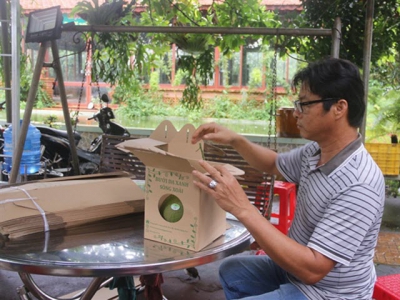Bà Rịa – Vũng Tàu uses origin traceability stamps on agricultural products

BÀ RỊA-VŨNG TÀU — More agricultural products in the southern province of Bà Rịa-Vũng Tàu now have traceability stamps which improve information transparency and product value.
Hồ Văn Kiệt, director of Sông Xoài Green Skin and Pink Flesh Grapefruit Co-operative in Bà Rịa – Vũng Tàu Province’s Phú My Town, packages a green skin and pink flesh grapefruit which has an origin - tracing stamp. – VNA/VNS Photo Hoàng Nhị
The Bầu Mây Tourism Agriculture Trade Co-operative in Xuyên Mộc District’s Hòa Hiệp Commune began growing 15ha of pepper under global good agricultural practices (GobalGAP) standards in 2015 and received GobalGAP certification for the pepper area three years later.
With GobalGAP-quality pepper, Bầu Mây has developed traceability stamps for its pepper and pepper products to boost sales at home and abroad.
Last year the co-operative exported more than 100 tonnes of pepper and pepper products at a price between VNĐ250,000 - VNĐ15 million (US$10.7 - 640) a kilogramme to many markets such as the EU, Japan, South Korea and China.
Lâm Ngọc Nhâm, director of Bầu Mây, said the cultivation of pepper under GlobalGAP standards and traceability stamps have improved the competitiveness of the co-operative’s pepper products in domestic and foreign markets.
The pepper products with the stamps have easier access to supermarkets and export markets, he said.
Bầu Mây now grows more than 30ha of pepper and produces about 200 tonnes of pepper and pepper products a year.
The Sông Xoài Green Skin and Pink Flesh Grapefruit Co-operative in Phú Mỹ Town’s Sông Xoài Commune has used traceability stamps for its green skin and pink flesh grapefruits since 2018.
The co-operative produces about 2,900 tonnes of green skin and pink flesh grapefruits a year, including 30 per cent of them with traceability stamps and planted under organic standards.
The co-operative’s grapefruits with traceability stamps sell for 50 per cent higher than the market price.
Hồ Văn Kiệt, director of Sông Xoài, said the co-operative’s grapefruits with traceability stamps are planted under safe standards and have high quality.
Farmers, co-operatives and companies in the province use traceability stamps for other agricultural products like banana, dragon fruit and vegetables planted under VietGAP and GlobalGAP standards.
However, the number of agricultural products with traceability stamps is still small, according to local authorities.
Last year, the province’s People’s Committee launched a project to manage an origin tracing system that aims to create close linkages among production processes, manage product quality, and foster the consumer habit of using products with traceability stamps.
The project also aims to raise the awareness of producers about information transparency.
Trịnh Đức Toàn, deputy head of the province’s Agro - Forestry - Fishery Management Sub-department, said to implement the project effectively, the sub-department in co-operation with relevant agencies has advocated origin tracing activities and provided training courses on technologies used for tracing origin to related stakeholders this year.
The sub-department will implement origin tracing on selected agricultural products on a pilot basis this year, he said.
The province has created zones for four specialty agricultural products. They are 1,200ha of longan, 1,000ha of soursop, 500ha of green skin and pink flesh grapefruit and 300ha of dragon fruit.
The four specialty agricultural products will be given support to build brand names and origin traceability to improve their value in the domestic market and for export.
At least 20 per cent of companies in production, trading and services will have an origin traceability system by 2025, under the province's plan.
Related news
 India might tighten pepper imports from VN, ministry warns
India might tighten pepper imports from VN, ministry warns The domestic pepper cultivation was also unfavourable, due to climate change, falling pepper prices and diseases.
 Mekong Delta to expand fruit, seafood production in response to climate change
Mekong Delta to expand fruit, seafood production in response to climate change The Cửu Long (Mekong) Delta plans an additional 450,000ha under fruit and seafood production by 2030
 Agro-tourism models improve farmers' income
Agro-tourism models improve farmers' income Agricultural production combined with tourism is offering higher profits for farmers in the south-central and southern provinces.